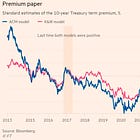BRIEFLY NOTED: For 2023-11-09 Th
The late-fall California Office; Tim Brook on the Little Ice Age & the fall of the Ming; very briefly noted; Paul Krugman on inflation pessimism, Jay Kuo on Trump filibustering in court, Robert...
The late-fall California Office; Tim Brook on the Little Ice Age & the fall of the Ming; very briefly noted; Paul Krugman on inflation pessimism, Jay Kuo on Trump filibustering in court, Robert Armstrong on our apparent soft macroeconomic landing, & Soumaya Keynes reviews all the r*s; & The Attention Economy Goes to Court, When Is It a Depression & Not a Rolling Sectoral Readjustment Reallocation, Sociobiology sort-of, & BRIEFLY NOTED: For 2023-11-05 Su…
ONE IMAGE: The California Office, Early November:
Queen Calafia’s weather sorcery still holds good:

We are very thankful.
ONE AUDIO: Timothy Brook, “The Price of Collapse: The Little Ice Age & the Fall of Ming China” (Princeton UP, 2023)
<https://overcast.fm/+s3EvQPhqg>
Very Briefly Noted:
War: Luke O’Neill: Myths can’t live forever: ‘Rabin was killed by a right-winger who was tired of pretending that he lived in anything besides a Jewish supremacist state, and now the nation’s political leaders have created a reality born of the assassin’s bullet…
Economics: Thomas Caulfield: ‘About 70% of the market for semiconductors is actually 12nm and above. Only 30% are in single-digit nanometers, and why is that? Moore’s Law was always an economic law… to scale transistors… lower cost per transistor… better power per transistor and better performance…. By… 14nm, the economics changed. The cost per transistor went up… you would use those technologies… [only] for applications that absolutely demanded either the performance… or the power…. [So-called “legacy node” chips have] the right functionality, the right feature set and at the best economics…
Barry Eichengreen: Certain Uncertainty in the US Bond Market: ‘With interest rates on ten-year US Treasuries close to 5%, more than triple the levels of two years ago, bond yields are attractive once again. If the fundamental factors driving them haven’t changed dramatically, then it’s possible that interest rates will fall and bond prices will recover now that the inflation scare has passed…
Economist: Forget the S&P 500. Pay attention to the S&P 493: ‘The alternative benchmark offers a better view of America’s stockmarket….
NIMByism: Addison Del Mastro: Prices and Truths: ‘“The primary philosophical task of urbanism might just be to convince people that nice places can be normal. That living on a vibrant, pleasant street is not the moral equivalent of eating chocolate cake for dinner”…
Technoutopianism: Sherry Turkle: Silicon Valley Fairy Dust: ‘Silicon Valley companies began life with the Fairy dust of 1960s dreams sprinkled on them. The revolution that 1960s activists dreamed of had failed, but the personal computer movement carried that dream onto the early personal computer industry. Hobbyist fairs, a communitarian language, and the very place of their birth encouraged this fantasy…
Neofascism: Jay Kuo: Trump Blustered… And Blundered: ‘Trump also tried to claim that Mar-a-Lago is actually worth between $1 billion and $1.5 billion, rather than the $18 million… assess[ed]…. Although the “deed of development rights” for Mar-a-Lago states that “the Club and Trump intend to forever extinguish their right to develop or use the Property for any purpose other than club use”—but to Trump this somehow isn’t binding. “‘Intend’ doesn’t mean we will do it,” Trump said with a straight face…
Ricardo Duque Gabriel, Mathias Klein, & Ana Sofia Pessoa: Political Costs of Austerity: ‘. Fiscal consolidations lead to a significant increase in extreme parties' vote share, lower voter turnout, and a rise in political fragmentation…. Austerity induces severe economic costs through lowering GDP, employment, private investment, and wages. Austerity-driven recessions amplify the political costs of economic downturns considerably by increasing distrust in the political environment…
Public Reason: Katie Notopoulos: How to fix the internet: ‘[For] online discourse to improve… move beyond… big platforms… [and the] bad incentives…. The way to get a massive audience was often by behaving badly…. Find a way to make money without pandering for attention… promising new gestures…. We, the internet users, also need to learn to recalibrate our expectations and our behavior…
Central Country: Shuli Ren & Elaine He: How Xi Jinping Led China’s Economy Astray: ‘It’s impossible to measure the Chinese leader’s popularity, but slumping property prices and high youth unemployment are enough to make many unhappy…. “Housing is to be lived in, not speculated on” sought to eradicate consumers’ blind faith in real estate as an asset class. His “common prosperity” drive was aimed at broadening the middle class, while painstakingly stressing that he was not advocating for a welfare state or egalitarianism. “Made in China 2025” was an effort to revive manufacturing. But Xi’s policy fixes also turned out to be problematic. He has ruffled too many feathers not only in the private sector but among local officials….
SubStack NOTES:
Economics: I think Paul overstates his case here: it was not that what appeared to be an adverse Beveridge Curve was confidently predicted to be a new normal; it was, rather, that it had some slope and was not horizontal—that vacancies would not go down without unemployment going up somewhat. But that is what they did. And I confess I am flummoxed:
Neofascism: Actually, this is one of the first principles of fascism, and neofascism: words are not communication except—possibly—within some in-group. Aimed at any out-group they are weapons. So, for Trump, if there is no penalty clause attached to its nonfulfillment and no funds placed in advance in escrow for that eventuality, it might as well have never been said:
Economics: People flashing lights saying that the Fed should start cutting soon, or else:
Economics: My view: (a) A substantial lack of knowledge of economic history—even of Robert Gordon’s observation that the Phillips Curve occasionally “slips derivatives”—and if you do not even know about the WWI, WWII, post-WWII, and Korean-War inflations, your odds of figuring out how this time it might be different than the 1980s are very low indeed. (b) A complete failure to recognize that posting a vacancy and getting online responses in the modern age is a very different and much less significant thing than taking out a classified ad with a phone number to call or an address to call at. It would not have been rocket science to take these into account, but…:
Economics: A very nice review of all the r*s from Soumaya Keynes. But I confess I do not understand her quote from Atif Mian. r* is the interest rate that balances aggregate demand and aggregate supply at full employment right now. It depends on market expectations. It has nothing to do whether it is a good and unbiased forecast of future outcomes. Perhaps Atif means that housing-market expectations are not general expectations? But, given overlap in populations, how could they be very different? I confess I do not understand:









How to fix the internet: "The big idea is that in a future where social media is more decentralized, users will be able to easily switch networks without losing their content and followings. “As an individual, if you see [hate speech], you can just leave, and you’re not leaving your entire community—your entire online life—behind. You can just move to another server and migrate all your contacts, and it should be okay,” says Paige Collings, a senior speech and privacy advocate at the Electronic Frontier Foundation. “And I think that’s probably where we have a lot of opportunity to get it right.” "
We should all offer extra coffee to Paige Collings. Grasping has been an important part of my online life/education since it's early days. I must confess that whenever I said that "I will leave" if hate speech proliferated here or on Substack in general, I always felt a bit of "golly, what am I gonna do then?" It is good to know that Brad may have the capability to take the entire ship elsewhere.
Retired corporate lawyer here. Concerning Trump’s interpretation of the meaning of “intend,” I’m not saying that he is correct in this case, but there are situations in contract drafting where “intend” is in fact used to identify a course of action that the parties hope will come to pass, and that they will make a good-faith effort to cause to come to pass, without creating an enforceable obligation to make it happen. That’s the idea with a “non-binding letter of intent” or a “memorandum of understanding” that parties use as a preliminary to the definitive agreement in all kinds of transactional settings, e.g., real estate development, mergers & acquisitions.
Alternatively, parties can also use a statement of intent to identify their mutual understanding of what the agreement, which is in fact definitive, means, as an aid to future interpretation, whether by the parties, their successors, or a court. In this specific case, it sounds like this was some kind of conservation easement, in which the only party with any kind of ongoing obligation was Trump and his entities, and the obligation was intended to be enforceable in favor of the grantee (the conservation trust).
I haven’t seen this distinction discussed anywhere, so I am pointing it out. I don’t think Trump’s interpretation is correct in this situation, but what he is saying is the kind of thing that I would expect a real-estate development guy to say, but, I hope, only in the appropriate context.